Aug 20, 2024 – Discussing Second Half Schedule and Sustainable Development Projects in Bhutan
The morning dawns at the Seoul Jungto Center.
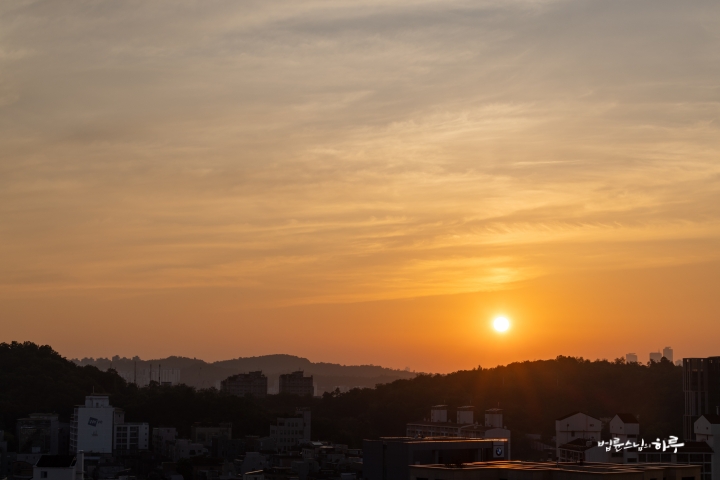
After completing his morning practice and meditation, Sunim had breakfast and headed to the Peace Foundation. From 10 AM, he discussed the overseas schedule for the second half of the year with the International Solidarity Team and JTS project managers.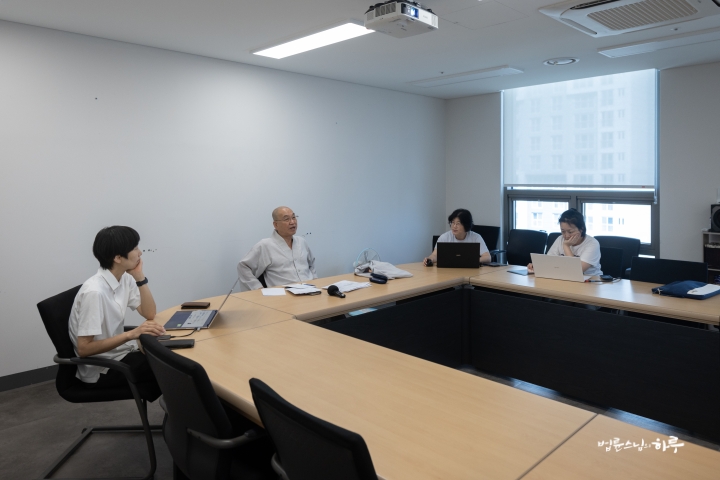
Following the first half of the year, Sunim will continue to visit 10 countries in the second half, including Switzerland, Germany, Türkiye, Syria, Bhutan, Australia, New Zealand, East Timor, Canada, and the United States, conducting JTS relief work and Dharma Q&A sessions without rest. At the end of the year, he plans to visit Mindanao, Philippines, and early next year, he will go on a pilgrimage to India. The meeting concluded after reviewing the detailed schedule, travel methods, and preparations.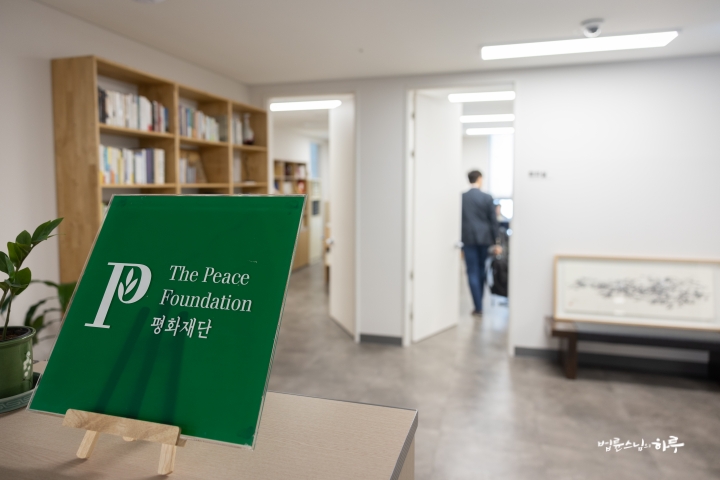
At 11:30 AM, a guest visited the Peace Foundation, had lunch with Sunim, and discussed many domestic political issues before leaving.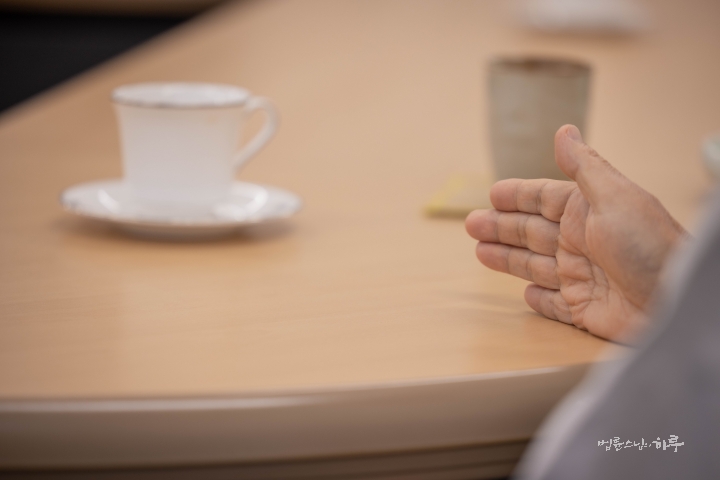
At 2 PM, Sunim met with Dr. Jo Seong-geum, who has long been researching Buddhist paintings of the Uyghur Kingdom and Tangut script. They had an extensive conversation about the process of creating Buddhist scriptures as woodblock prints and the historical significance of these artifacts. After taking a commemorative photo together, Sunim encouraged further research on Buddhist historical artifacts before concluding the meeting.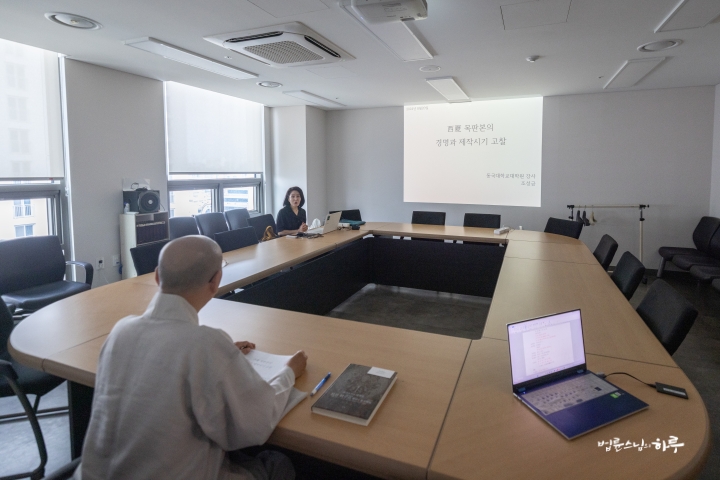
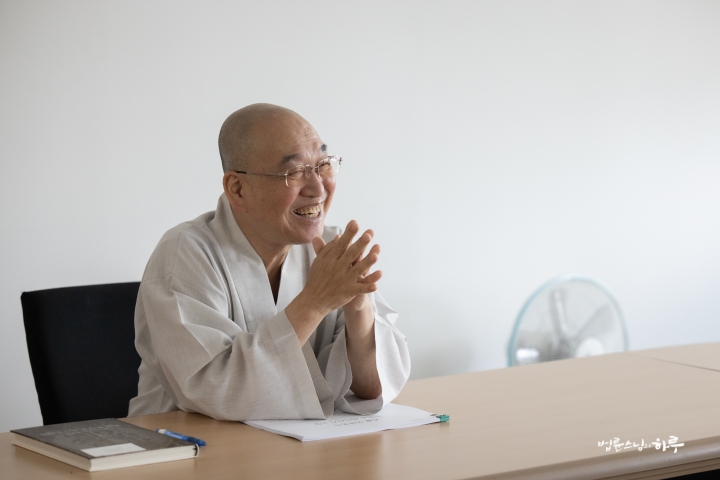
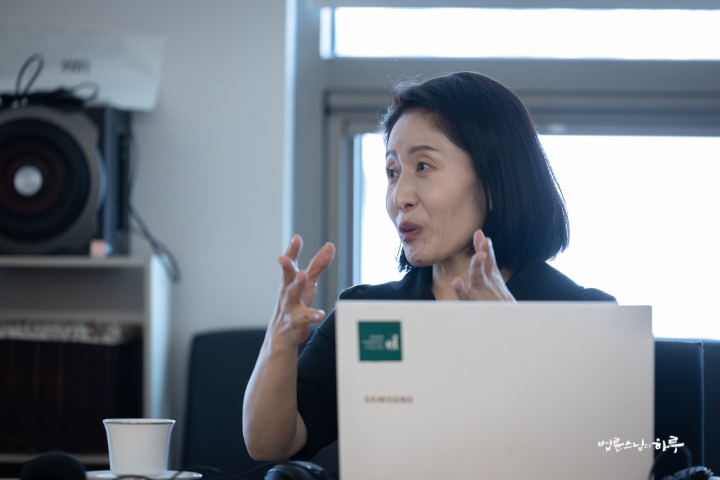
Soon after, at 4 PM, Rinchen Dawa from Bhutan visited Sunim to discuss the schedule for the upcoming visit to Bhutan in the second half of the year. Since Rinchen Dawa needs to interpret for Sunim during every visit to Bhutan, they shared detailed information about what programs to conduct for sustainable development in the second half of the year and what preparations are needed.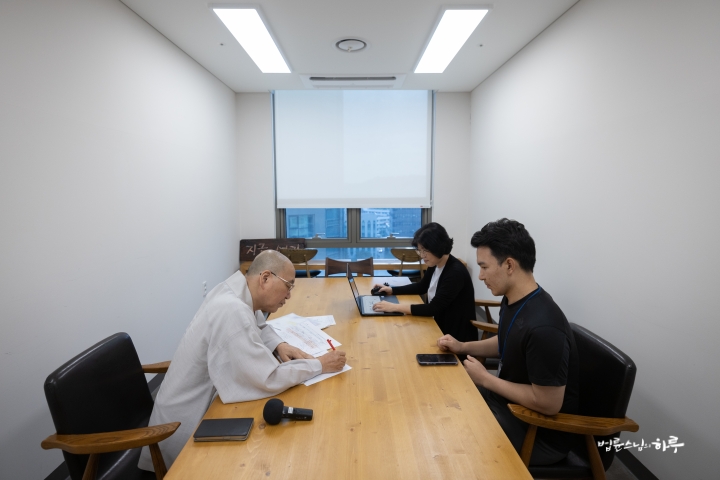
“To start sustainable development in earnest, we need to survey all the villages in Zhemgang and Trongsa districts. Zhemgang alone has 8 gewogs, and each gewog has 5 chiwogs, so we need to survey all 40 chiwogs. Even if we visit 3 chiwogs a day, it will take 13 days. Similarly, we need to survey all the villages in Trongsa district. Only then can we start projects targeting the entire district over the next 5 years.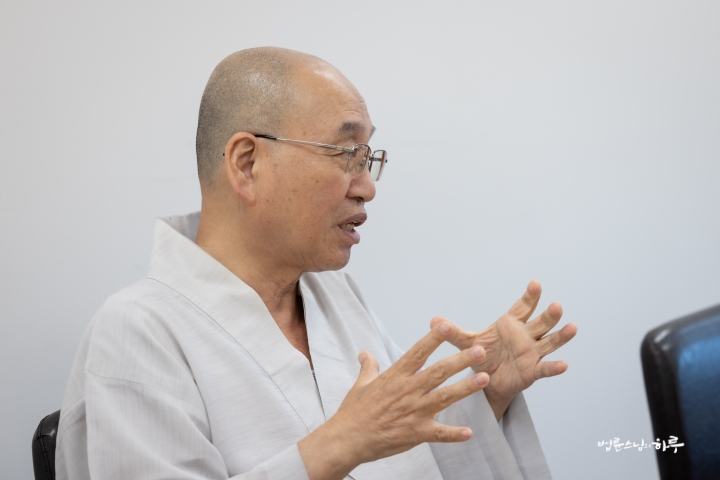
To Begin Sustainable Development in Bhutan in Earnest
We plan to invite all village leaders, take them on a bus tour to show them the irrigation construction in Nangla Chiwog, road construction in Khomshar Chiwog, newly built houses for the poor in Nimshong Chiwog, and school renovation in Langdurbi Chiwog. We need to explain in detail the principles behind these projects. Then, we need to tell them how to develop their own villages when they return. So, I plan to fully commit myself to this work this winter. We’re also planning to recruit many volunteers from Korea. There are many people with skills like truck driving, excavator operation, cement plastering, and carpentry who want to volunteer in Bhutan. There are even foreigners from Germany and Canada who want to come and volunteer. To create an atmosphere for village development in Bhutan, we need many overseas volunteers to work together with local residents. Working together, singing together – that’s what gives the villagers energy. After all, things only work when people feel good. When hearts are twisted, even doable things become impossible.”
Sunim then shared his ideas for conducting medical camps in Bhutan.
Planning Medical Camps for Bhutan Residents
“We need to hold medical camps in every village for ophthalmology, dentistry, and otolaryngology treatments, but there’s the issue of bringing medical equipment from Korea. The laser surgery equipment is too heavy to be loaded onto small planes, and transporting it from the airport to Zhemgang is also a big problem. So I thought, why not bring the villagers to Gelephu on the Indian border and hold the medical camp there?”
Hearing Sunim’s suggestion, Rinchen Dawa proposed: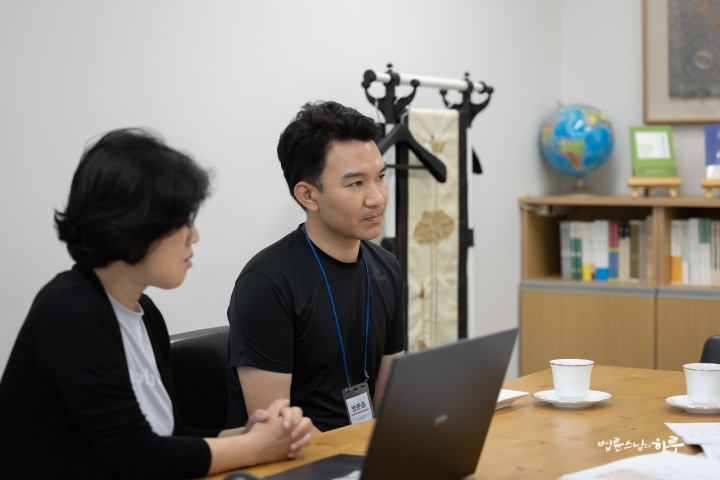
“Bhutanese people have a desire to go on pilgrimage to India, so I think it would be good to visit Bodhgaya, the sacred site of the Buddha, then visit Sujata Academy that Sunim established, and hold the medical camp there.”
Sunim replied: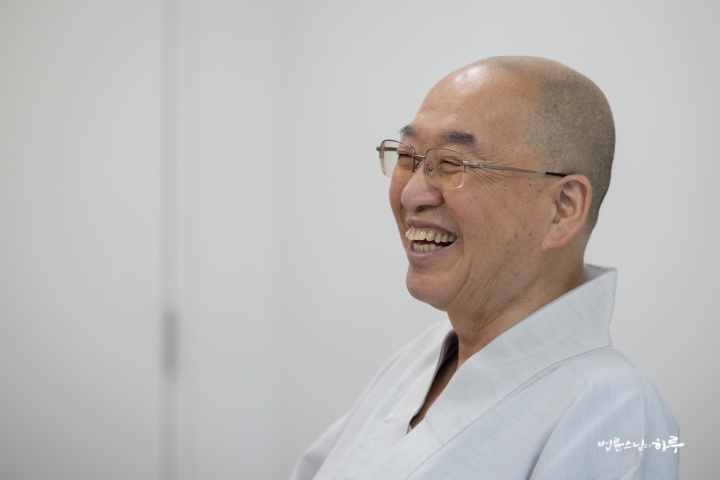
“That’s a good idea too. We could either build a temporary hospital in Gelephu for the medical camp, or bring people to Bodhgaya for a pilgrimage combined with a medical camp. Let’s continue to develop these ideas and discuss them further.”
They agreed to continue discussions while surveying Bhutan together and concluded the meeting.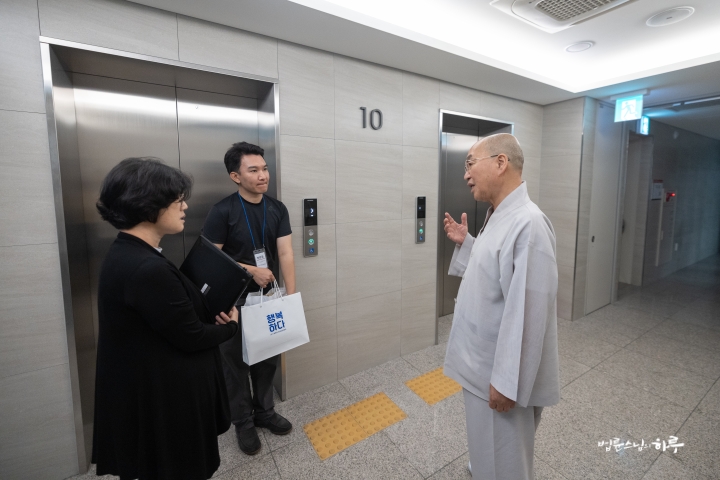
The sun set as meetings continued throughout the day. In the evening, Sunim worked on proofreading manuscripts and various other tasks before concluding his day.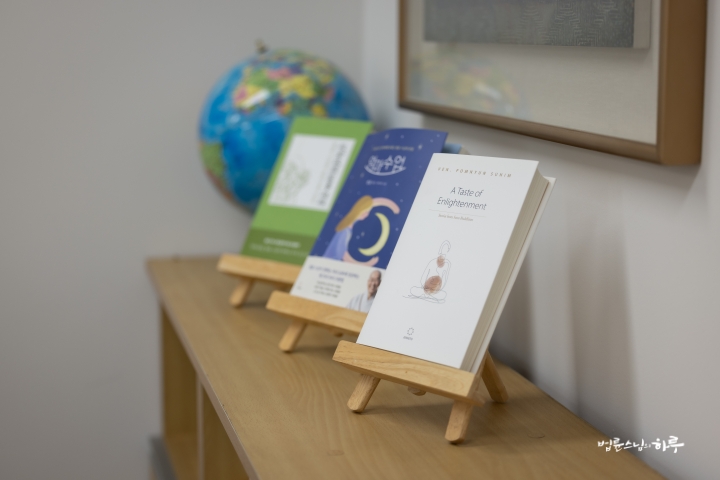
As there was no Dharma talk today, the article will be concluded by sharing a conversation between a questioner and Sunim from last week’s Friday live Dharma Q&A session.
I Lost My Sight, Suffer from a Rare Disease, and Can’t Walk. Can I Be Happy Too?
“Have you received a disability rating?”
“Yes, I received a visual impairment rating long ago, but because we don’t know the cause of the rare disease, it currently has no official name.”
“Anyway, whether you can’t see, hear, or walk, you’re still alive, right?”
“Yes, I’m alive.”
“Everyone wishes for their legs not to hurt when they do, for their eyes to see well when they don’t, and for their ears to hear well when they don’t. We all know it would be good if these things improved. But how can we change the reality that your eyes don’t see and walking is difficult? It’s not because of sins from a past life, it’s not God’s punishment, and it’s not your fate. It’s simply that this illness has occurred in you.
I’m 71 years old this year, and until now, people used to say I bounded up mountains as lightly as a wild animal. But after a recent mountain trip, my legs hurt, and when I got checked at the hospital, they said my meniscus was torn. So now I can’t go to the mountains anymore. Even just walking has become uncomfortable.
From the perspective of a visually impaired person like you, you might think, ‘Sunim, is that really such a big deal? You can just use a walking stick, right?’ Similarly, if we dwell on the past thinking, ‘I used to be so good at climbing mountains,’ we can’t help but feel distressed.
‘I’m over 70 now, and I’ve used my legs well for the past 70-plus years. I’ve walked twice as much as others. It’s about time they broke down. Let’s stop going to the mountains now.’
We have no choice but to accept it positively like this. Regardless of how well or poorly you’ve done, you’ve lived your life well until now. You’re still alive, you can move, use your hands, eat food with your own hands, and take care of your bodily functions on your own. So you should think positively about yourself, saying, ‘I’m fortunate that I don’t need someone else’s hands to eat yet.’
If you lost money in stocks or fell victim to voice phishing, what would you do now? If you have a receipt that could get your money back, or if you could file a lawsuit and win in court, I’d say go for it. But when you can’t do anything about it, worrying only hurts you. The more you worry, the more you lose. It’s better to stop at the first level of loss rather than moving on to the second or third level – that would be foolish. Similarly, if you keep thinking about the past regarding your physical disability, you’ll only feel sad and distressed. Isn’t it fortunate enough that you’re still alive? Being grateful for being alive and thinking positively will help you stabilize mentally and aid in your treatment. There’s no other good alternative, is there? The more anxious and frustrated you are, the worse your condition will become. Just being grateful for being alive will actually help with your treatment.”
“Yes, thank you. I’ve gained a lot of strength from your words today, Sunim. I will continue my rehabilitation therapy as I have been doing, without giving up. I will take care of my mind as well to prevent my condition from worsening.”
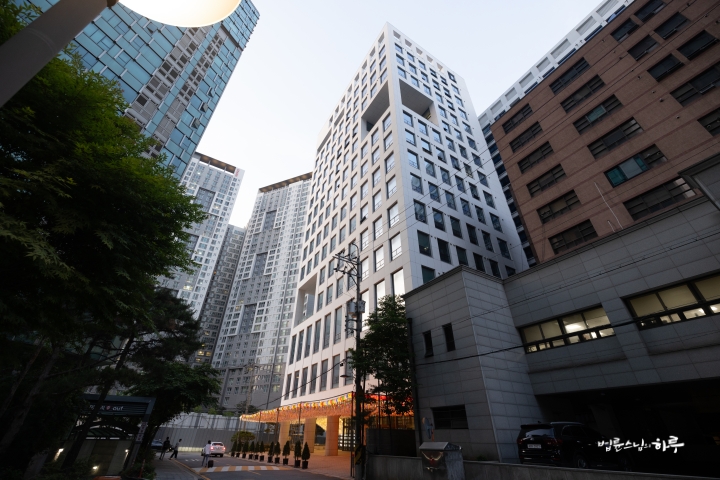
“Yes, you should consistently receive rehabilitation therapy. Even if there isn’t a significant effect, you should consistently receive rehabilitation therapy and always think positively. Think, ‘I’m fortunate to be even this well. Thank you.’ Like this. Don’t complain saying, ‘I met the wrong doctor and couldn’t cure my illness.’ Instead, have a mindset of ‘Thank you for treating me.’ This is good for both mental and physical health. I hope you maintain such a positive attitude while consistently continuing your rehabilitation therapy.”
“Thank you.”
Tomorrow morning, Sunim will attend a meeting of religious leaders for national reconciliation and peace, followed by a live broadcast of the weekday practice session. In the afternoon, he will participate in a Peace Foundation research seminar and planning committee meeting, and then conduct a live broadcast of the evening practice session.
A Day in the Life of Sunim is translated by AI, edited by volunteers





